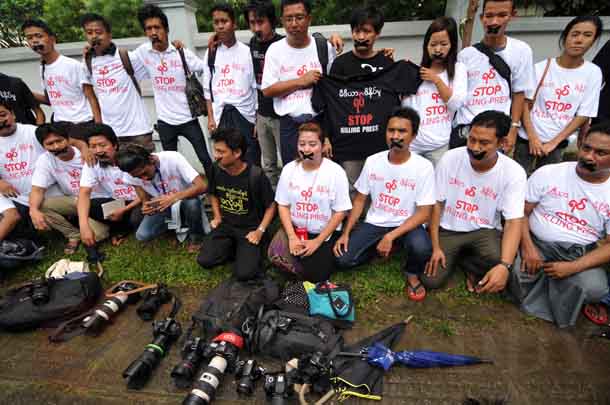Posts Tagged ‘Media’ (15 found)
A Return to the Bad Old Days for Freedom of Expression
 In a scarcely believable and punishingly harsh act of repression, four journalists and the CEO of Unity journal were sentenced by a Magwe Region court on 10 July to ten years imprisonment with hard labor for reporting on a story on a chemical weapons factory, giving a damming indictment of press freedom in Burma today. This occurred just days after President Thein Sein described Burma as “one of the freest in Southeast Asia” due to media reforms.
In a scarcely believable and punishingly harsh act of repression, four journalists and the CEO of Unity journal were sentenced by a Magwe Region court on 10 July to ten years imprisonment with hard labor for reporting on a story on a chemical weapons factory, giving a damming indictment of press freedom in Burma today. This occurred just days after President Thein Sein described Burma as “one of the freest in Southeast Asia” due to media reforms.
In January 2014, Unity journal published an investigative report on a chemical weapons factory in Magwe Region, central Burma, with accounts from factory workers, local villagers and photos of the site. While the Burma government eventually admitted it is a ‘standard ordnance factory’ that produces ordinary military equipment, an analysis of the images by the Center for Nonproliferation Studies concludes that there is strong evidence that this isn’t just a normal arms factory, and is consistent with chemical weapons factories in other places, such as North Korea. It is ironic that the journalists who published a story on chemical weapons are jailed for ten years under the State Secrets Act, while the Burma government denies it is making chemical weapons. Related to this, a point that has been overlooked slightly over the past week is that Burma must implement the measures of the Chemical Weapons Convention that it signed in 1993 and thus clear up the issue of whether Burma does have the capability to manufacture such equipment, as the Unity journalists reported and are now in prison for. […]
• • •Burma: State Leash on Media Freedoms at its End
With the passage of Burma’s Press Law in April this year, there had been a glimmer of hope that the case of the journalists from Unity Journal would be given a bit of protection for their daring expose of an alleged chemical weapons plant in the Magwe division last January.
After all, the new law guaranteed that no journalist may be jailed for doing her or his work […]
• • •Police Investigations and Prosecutions Used to Harass News Media
Until recently, the media freedom situation in Burma was very promising but this is no longer the case. Reporters Without Borders is alarmed by the interrogation of many newspaper editors since 20 June and by the president’s recent expressions of hostility to freedom of information. In a threatening comment on 7 July, President Thein Sein said: “If there is any media that exploits media freedom and causes harm to national security rather than reporting for the sake of the country, effective legal action will be taken against that media.” […]
• • •Call for Probe Into Military Junta’s Crimes Against the Media
Reporters Without Borders has written an open letter to Burmese President Thein Sein, who begins a two-day visit to France tomorrow, calling for an investigation into the former military government’s crimes against the media since 1962 […]
• • •European Parliament Urges Burma to Respect Right to Information
Reporters Without Borders hails yesterday’s European Parliament resolution on the plight of Burma’s Rohingya Muslims, who are not only persecuted by the authorities and denied Burmese citizenship, but also denied access to news and information and subjected to an information blackout […]
• • •








 All posts
All posts